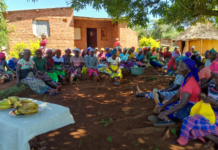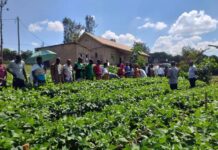The needs of modern farmers are changing rapidly as there is a growing dependency on the latest technology to ensure cost effective agricultural production. This is particularly true in terms of their requirements regarding financing.
It is no more just a case of financing buildings and equipment, which also provide a form of surety. Nowadays their needs are also for financing the latest farming aids such a drones and moisture sensors as well as substantial investments in modern technology software platforms.
This came through strongly in the conference session devoted to “Resilience during Times of Adversity” on the second day of the Africa Agri Tech Conference and Exhibition at the SunBet Arena, Menlyn, Pretoria, on 15 March.
The day’s focus was on Science and Technology with Cape techno guru Bobby Brown as Programme Director.
The specific session on the resilience needed today in the agricultural industry was led by Professor Andre Jooste, from the Department of Agricultural Economics at Stellenbosch University. Panel members were Loffie Brandt, Head of Sales Enablement at ABSA Agribusiness, and Dr Albert Strever, Senior Lecturer and Coordinator of the Agri Innovation and Entrepreneurship Initiative at Stellenbosch University.
Brandt said calculating the incorporation of technology benefits into the funding mechanism for production financing and credit lending were not easy. He said that a lack of historical data made it difficult to incorporate the benefits of these latest farming aids into credit applications, but ABSA was undertaking tests on these aspects as it realised this was the direction in which this business was moving.
Jooste said that it was now important for banks and other financiers to become an integral part of these businesses to ensure sustainability as the farming environment went through major changes.
Brandt said it was not easy for banking institutions to change long-established systems as they worked in strict regulatory frameworks, so it was very much a learning process.
The morning had kicked off with an interesting session on the challenges facing farmers involved in high value commodities such as macadamia nuts, berries, avocado pears, hard and soft citrus where cost pressures had resulted, in many cases, in negative returns for the farmers involved.
A major factor here was the loadshedding which had forced many farmers to use large generators where operating costs were as much has five times higher than when using electricity. Selling prices of these commodities had also fallen while production and logistics costs had risen, making it a tough business.
Another interesting session looked at cultivated meat made from animal cells. It was led by Dr Paul Bartels, CEO of Mogale Meat, and is making significant progress in this exciting development which will be a major benefit in the future as growing populations need more animal protein to eat. Mogale Meat was already faring well in a global contest to evaluate cultivated meat producers and Bartels envisioned a future with compact production plants located in shipping containers which were located near the markets for these products.
The day’s programme ended with Jason Brantley, Director – Asia, Africa and the Middle East for John Deere, one of the events sponsors, detailing how the advances in its products and the way the company now operated were contributing to increasing efficiencies and thereby cutting costs for the agricultural industry.
Set up joint ventures with a number of smaller companies that specialised in the data, and technology spheres to add value to their products as the 186-year-old company transformed to a smart technology company and was no longer just a supplier of products that used technology.
One of the smaller companies now in the John Deere fold was Kenya-based Hello Farmer, which is a tractor-sharing application of benefit to smallholder famers and which would be extended in Africa where it served a critical need as food requirements increased.
Brantley said that all John Deere tractors would have a measure of connectivity by 2026, which would also be beneficial to smaller farmers.










[…] Source link […]
Comments are closed.